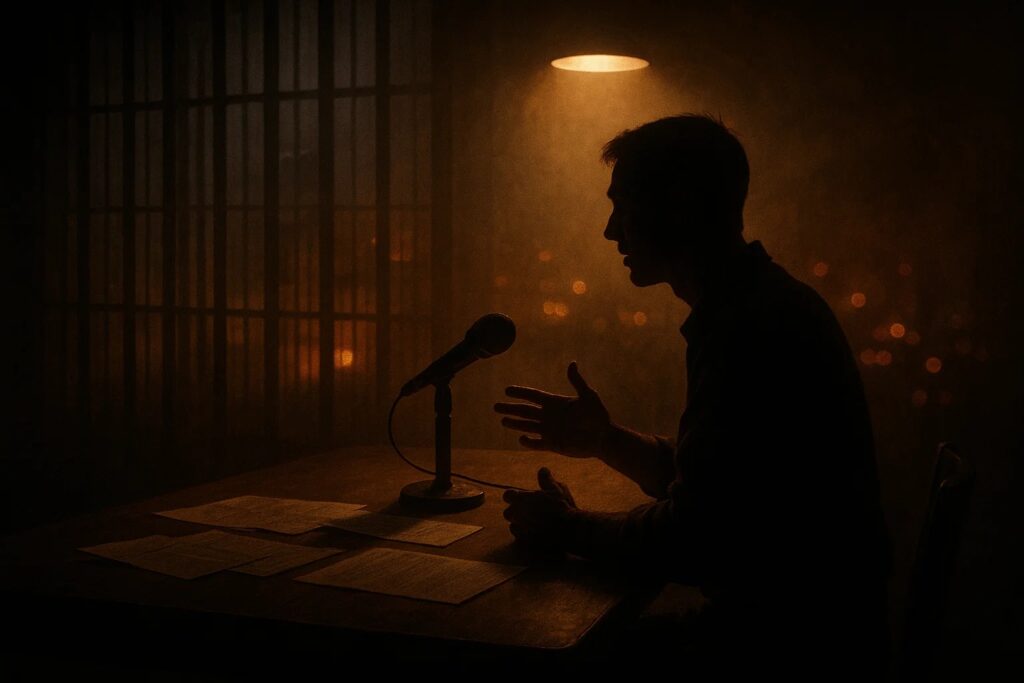
This isn’t just another true crime show where narrators recount details over grainy reenactments. It’s a platform where individuals tell their own stories, in their own words, about choices that led them down dangerous paths and the resilience it took to come back. And in that sense, My True Crime Story is less about sensationalism and more about second chances.
In this deep dive, we’ll unpack what makes My True Crime Story unique, explore its seasons so far, answer common viewer questions, and reflect on why this show resonates so deeply in a world where crime stories are everywhere, but rarely told by the people who lived them.
The Heart of My True Crime Story
At its core, the show is about accountability and redemption. Each episode features a person who once lived on the wrong side of the law, whether that meant drug trafficking, fraud, theft, or organized crime. Instead of glorifying these choices, the show gives viewers a front-row seat to the consequences: prison sentences, broken families, lost years, and the daily struggles of trying to turn one’s life around.
Remy Ma, who serves as host and narrator, brings a particularly powerful presence. Having spent six years in prison herself before returning to rebuild her life and career, she speaks with authority and empathy. She doesn’t sensationalize these stories, she honors them. That authenticity is what separates My True Crime Story from countless other entries in the genre.
The series began on VH1 with the promise of giving voice to people who often never get to tell their side. It was part of a broader movement in television: not just to entertain, but to spark conversation about rehabilitation, justice, and the complexities of human decisions.
Season 1: Finding Its Voice
When Season 1 premiered in 2021, it introduced audiences to a world where true crime felt more like a confessional booth than a police report.
Episodes featured stories ranging from small-town hustlers who became major players in illegal schemes, to suburban parents whose secrets unraveled in courtrooms. Each story was told directly by the people who lived it, supported by dramatizations, archival footage, and candid interviews.
For many viewers, the biggest takeaway wasn’t the crime itself but the humanity behind it. Audiences saw regret, resilience, and the longing for redemption. They also saw the ripple effects crime has on families, children, and entire communities.
Season 1 quickly found its audience, tapping into both true crime fans and viewers who craved something with more depth and authenticity than the average crime show.
Season 2: Stories Get Bigger, Stakes Get Higher
Building on that momentum, My True Crime Story returned for Season 2 in 2022. The production leaned into even more complex stories and broader themes.
This time, viewers heard from people who had been involved in elaborate fraud schemes, multi-million-dollar drug rings, and even international hustles. The narratives became more layered, sometimes involving multiple countries, intricate legal battles, and high-profile courtroom drama.
But what kept it grounded was the show’s commitment to the personal. Each episode reminded viewers that behind every headline and statistic was a human being, grappling with choices that defined their lives.
Season 2 also highlighted more stories of redemption, entrepreneurs who rebuilt businesses legally, parents who reunited with children after years apart, and survivors who now dedicate themselves to steering others away from making the same mistakes.
Will There Be a Season 3 of My True Crime Story?
One of the most common questions fans ask is whether Season 3 is on the way.
As of now, VH1 hasn’t officially confirmed a new season. However, the demand is clearly there. True crime continues to dominate entertainment, and this series fills a unique niche: giving the spotlight to people who lived the story, not just the detectives who solved it.
Remy Ma herself has hinted in interviews that she sees the series as important work, both personally and socially. That kind of passion from the host, coupled with steady audience engagement, makes a Season 3 more likely than not.
So, while we don’t have an official release date yet, fans should stay hopeful. If Season 3 happens, expect even more gripping, human-centered storytelling.
Where Can You Watch My True Crime Story?
If you’re just discovering the show, you may be wondering how to catch up. Here’s a quick guide:
VH1 – The series originally aired here, and reruns are often available on the channel.
Streaming Services – Depending on your region, past episodes may be available on platforms like Hulu, Paramount+, or Philo. Some cable packages also include VH1 on-demand options.
Amazon Prime / Apple TV – Individual episodes or entire seasons can sometimes be purchased for streaming through digital retailers.
Always check local streaming catalogs, as availability can change.
What Channel Is My True Crime Story On?
The show airs on VH1, a channel long associated with music, culture, and reality-based storytelling. For viewers in the United States, VH1 remains the primary broadcaster. International availability may vary depending on local cable or streaming partnerships.
Is My True Crime Story Real?
Yes, it is very real. Every story is told by the people who actually lived it. These aren’t actors pretending to be criminals or victims. The dramatizations used in the show are there to illustrate events, but the core narrative is always delivered by the individual who experienced it.
This distinction matters. While many true crime shows can feel sensational or distant, My True Crime Story invites viewers into the messy, complicated, and deeply human reality of these situations. The participants aren’t asking for sympathy, they’re asking for understanding. And that difference makes the series stand out.
Why This Show Resonates So Deeply
There’s a reason My True Crime Story has struck such a chord with viewers. It goes beyond curiosity about crime. It taps into something universal: the idea that people are more than the worst choices they’ve made.
Empathy: Hearing directly from those involved allows viewers to see them as whole people, not just criminals.
Reflection: The stories force us to think about the systems, social, economic, cultural, that shape decisions.
Redemption: The most powerful moments are when participants describe how they’ve tried to rebuild, repair, or redefine their lives.
In a world often quick to judge, the series reminds us that every story has layers, and every person has the capacity to change.
Cultural Impact and Criticism
Like any show in the true crime genre, My True Crime Story isn’t without critics. Some argue that giving former criminals a platform risks glorifying illegal behavior. Others worry about retraumatizing victims or downplaying the harm caused.
The producers have attempted to address these concerns by balancing the narrative. The show consistently emphasizes consequences, prison time, broken trust, family pain, alongside the crimes. And by focusing on redemption, it frames the stories as cautionary tales, not glamorized adventures.
Still, these debates are part of why the show matters. It pushes us to question how we consume stories about crime and what responsibility media has in shaping public perception.
The Human Side of True Crime
What sets My True Crime Story apart isn’t just the format, it’s the way it encourages viewers to look at crime differently. Instead of cold statistics or detached narration, we hear the trembling voices of people reliving their darkest hours. We see their faces as they describe regret. We witness their determination to rebuild.
That raw humanity is powerful. It transforms the audience experience from passive consumption to active empathy. You’re not just watching a crime unfold, you’re seeing what it cost, and what it took to survive it.
Looking Ahead
Whether or not Season 3 arrives, My True Crime Story has already carved a unique space in the true crime landscape. It stands as both entertainment and testimony: a reminder that every headline hides a human being, and every mistake carries both pain and the possibility of growth.
For fans of true crime, the show offers suspense, drama, and emotional depth. For those skeptical of the genre, it provides a more thoughtful and responsible approach to storytelling. And for the people brave enough to share their stories, it offers a chance to be seen not just for what they did, but for who they are today.
Final Thoughts
In an age where we’re flooded with true crime podcasts, documentaries, and TikTok breakdowns, My True Crime Story feels different. It’s not about the shock value. It’s about truth, consequence, and redemption.
So the next time someone asks, “Is My True Crime Story real?”, the answer is yes. Real people, real crimes, real regrets, and real second chances.
And maybe that’s why it resonates so strongly: because in the end, it isn’t just about crime. It’s about being human.

I am Jeremy Jahns – Your Cinematic Explorer
Immerse in movie reviews, Hollywood insights, and behind-the-scenes stories.